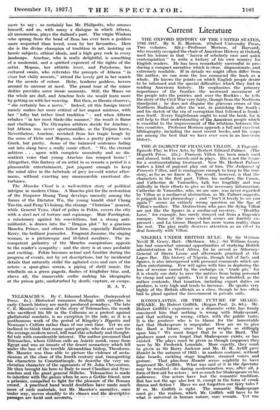i i cton
A Winter Afternoon's Entertainment
WREN Mr. Eden Phillpotts desires to convey his tolerant philosophy of life and art, it is now his custom to relate, with considerable modernism of humour, and much urbanity of an older vintage, some antique myth or fable. Perhaps, just as one is sometimes nostalgic for Wessex when admiring the vigour of his Dartmoor studies, so, in perusing these charming exercises, one recollects the sharper perfections in this manner wrought by some famous Frenchmen. Yet Mr. Phillpotts continues to affine the edges of this little. craft of his ; and Arachne will induce many an amused. smile, especially from those who did not laugh at The Farmer's Wife.
This is the tale of the gifted but rash artist, the daughter of Idmon the dyer, Arachne, who was taught how to weave silken pictures by Athena herself, but who, daring to be original, challenged the grey-eyed goddess to a contest in her peculiar skill, and, according to cut-and- dried dictionaries, miserably hanged her presumptuous self; and became a spider. Comparative mythology may have
more to' say : so certainly; has Mr. Phillpotts, who amuses himself, and us, with many a dialogue in which Athena, all unconscious, plays the dullard's part. The virgin Wisdom -who sprang from the head of- Zeus has ever been a goddess more respected than loved, even by her favourites. Here she is the divine champion of tradition in art-, -insisting on heroic subjects, ethical ideals, and a high grey rock in every landscape. Arachne, who is really delightful, is something of a modernist, and a spirited exponent of the rights of the artist. Mopsus, her athletic lover, and Polydorus, her cultured swain, who reiterates the precepts of Athena " in clear but chilly accents," attend the lovely girl in her search for the secrets of colour. Liebe, tenderer goddess, hovers around to succour at need. The grand tour of the minor deities provides some ironic moments. Still, the Muses on the whole are dull, and Arachne feels she would learn more by getting on with her weaving. But then, as Hecate observes, " she certainly has a nerve." Indeed, all this foreign travel merely makes her more critical of her august mistress, with her " lofty but rather tired tradition ; and when Athena rebukes " in her most Slade-like manner," the result is flame and challenge. The Olympian arbiters decide for Arachne ; but Athena was never sportsmanlike, as the Trojans knew. Nevertheless, Arachne, ravished from her tragic bough by the arms of Hebe and Mopsus, makes a pretty picture--not Greek, but pretty. Some of the balanced sentences fading out into slang have a really comic effect. " We, the eternal arbiters . . . agree with complete unanimity and no dis- sentient voice that young Arachne has romped home ! Altogether, this fantasy of an artist in so remote a period is a pleasurable entertainment, just piquant enough to keep the. mind alive in the hebetude of grey ice-cold winter after- noons, without exacting any unseasonable emotional dis- turbance.
The Manchu Cloud is a well-written story of political intrigue in modern China. A Manchu plot for the restoration of the Emperor Hsang Tung develops uneasily among the forces of the Dictator Wu, the young bandit chief Chang Tso-tin, and Feng-Yi-hsiang, the strange " Christian" general, while General Tyau, chief of police in Pekin, covers the city with a steel net of torture and espionage. Muir Farrington, a missionary against - his convictions, but a strong anti- militarist, is drawn into the " Dragon plot " by a gracious Manchu Prince, and others follow him, especially Kathleen Kerry, the brilliant journalist. Fragrant Jasmine, the singing woman, is a picturesque and ill-fated auxiliary. The in- competent gallantry of the Manchu conspirators appeals to the reader's sympathy ; and the story is at once probable and exciting. Pekin becomes actual and familiar during the progress of events, not by set descriptions, but by incidental details that naturally strike the agitated eyes and ears of the actors—a spun-glass screen, a piping of shrill music, the windbells on a green pagoda, flashes of kingfisher blue, and, above all, the immovable scribe making his ideographs at the prison gate, undisturbed by death, capture, or escape.
FL A. T.







































 Previous page
Previous page